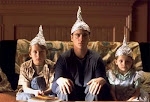 I watched about 30 minutes of Stanley Kubrick's 2001: A Space Odyssey last night before I couldn't hold my eyes open any more.
I watched about 30 minutes of Stanley Kubrick's 2001: A Space Odyssey last night before I couldn't hold my eyes open any more.
Initial observation: this movie (made in 1968) is a lot slower than what I'm used to (now 40 years later). Audiences in the 60's must have had a more tenacious attention span than we do nowadays.
My initial reaction to the famous ape scene at the beginning of Space Odyssey was "Oh pshh, evolution... whatever." Then I realized something else: We are trained by modern science to assume that humanity is advancing, or improving, or (dare i say it?) evolving... both physically and mentally. However, this is not necessarily true.
While it is true that we have more advanced gadgets than ever, this does not mean that we ourselves are improving. For example, there are now vast amounts of information available no further than a mouse-click away... still, that doesn't necessarily mean we're any smarter.
What does it mean to be "better" or "improved?" What is our gauge for personal development or advancement?
Judging by the aforementioned ape scene, Stanley Kubrick's point of reference for human advancement, or the thing that sets certain apes apart from other animals, is the ability to develop and use tools. But this is a misleading standard of measurement. While resourcefulness and innovation is good, these things are not dependable measurements of intellectual, physical or spiritual health.
Traditional Jews, I have heard, perceive that humanity is declining from one generation to the next. In other words, children can't helping falling a little behind their fathers. Their point of reference for this would be the Old Testament (the Torah), which illustrates a gradual degeneration from each father to his son, and from that son to his sons, and so on. As a Christ-follower I agree completely.
It is obviously true that children inherit the sins of their fathers. A father's vice turns into a life-crippling sin (or "destructive habit," if you will) for his son. Abraham, for example, the first Jew ever, had a habit of telling lies to get himself out of sticky situations. This vice goes on to plague his descendants with increasing intensity as time goes on.
Throughout the Old Testament the Hebrews become more and more distant from Yahweh. He doesn't seem as readily available to the Jews of David's time, for example, as He was to the original Patrons, Abraham, Isaac and Jacob. I gather that these original patrons didn't think it odd to hear God's voice on a semi-regular basis, whereas seeing visions and dreaming dreams became increasingly rare for their posterity.
There is little doubt in my mind that humanity started off with more physical, intellectual and spiritual prowess than we have the ability to appreciate these days. A few people these days have especially good genes, but that's nothing compared to the genes that God gave Adam and Eve. And this makes sense, if we view humanity realistically, on a gradual decline. This coincides with the general state of the universe, which is heading away from order toward chaos (refer to the Second Law of Thermodynamics, my favorite by the way).
There's a logical explanation for the unavoidable degradation of all things: Everything is corrupted by spiritual impurity (sin). Since the original humans, this spiritual impurity has made human living into a gradual dying. Everything was at peace, a perfect equilibrium, until something foreign tainted all existence as we know it. Thus sin has affected each generation, gradually twisting and killing us on the most basic level.
Consider DNA :
(I'm not a PhD in cellular biology, mind you, but I've picked up a few things here and there)
I have heard people complain that Bible doesn't explain how Adam and Eve's children could have procreated apart from having sexual relations with each other (God spoke the whole universe into existence and then forgets this little oversight). There is an interesting possibility here that has to do with Adam and Eve's almost perfect DNA versus ours nowadays, which (i have heard) is full of defects (which lead to all kinds of undesirable imperfections).
I have heard that siblings should not have sex with each other because of all the deformities their children would have (either that, or because this is a Judeo-Christian moral standard that most people take for granted). I have also heard that everyone's DNA has a lot of flaws, however many if not most of these flaws never surface. The chances of these defects surfacing increases dramatically when two closely related DNA's overlap (when related people's conceive a child). But what if two people (the children of Adam and Eve) had almost perfect DNA? If this were the case, then defective children would not be an issue. Notice that it's not until later that God makes explicit laws forbidding sex between closely related people (Leviticus 18).
Humanity is decaying spiritually, therefore every other aspect of human existence is also decaying (mental and physical). What or Who might correct this downward spiraling momentum? We are imperfect people giving birth to children who are even more imperfect. We need reconciliation. We need healing at most fundamental level of our existence: our souls.
2001: A Space Odyssey -- Monkeys to Men
Subscribe to:
Post Comments (Atom)

























14 comments:
I fell asleep in 1968 too.
When I saw it in 68, I knew I was watching Something Important, so it was okay that it was incredibly tedious. At least, thats what I thought at the time. Ditto the stiff dialogue, which, good lord, I can still remember.
Now I think: Get to the freakin' POINT already!
Patrick, I love the tone of your posts.
Please do rent and watch Andrei Tarkovsky's films. Especially Stalker and The Mirror. Such honesty and truth laid threadbare before us. Those are real spirtual and emotional experiences.
And I suggest watching them in the silence of the night, and in total solitude. Experiences mate, that is what I call them.
Patrick, my friend, I believe you're actually missing the whole point of the "Ape Scene." This scene has nothing at all to do with evolution, at least as we secular folks think of it. The apes are not "evolving" into tool-using creatures, they are being turned into tool users by the Monolith. The Monolith isn't God, of course, but it stands in for God -- even if the film isn't terribly spiritual, the fictional mechanics of the story clearly endorse a form of intelligent design, NOT evolution.
I will add my voice concurring about Tarkovsky. I love Kubrick, but Tarkovsky is amazing. Though if you found 2001 boring, just wait for Solaris!
They say this place has changed
But strip away all of the technology
And you will see
That we all are hunters
Hunting for something
That will make us okay.
-"Needle and Thread", Sleeping At Last
I think human advancement is generally "proven" by trumpeting the advancements of science and technology. But all our advancement is usually driven by finding better ways to kill each other--oldest trick in the Book. Great thoughts on the matter.
By the way, I sat all the way through "2001." The only true achievement of the film, in my opinion, is the new level of realism it brought to the way space travel was/is depicted in film. At the time it was visionary for that in itself. We hadn't even landed on the moon.
As far as the story itself, read the novel. If you like sci-fi, it's one of the classics, and brilliantly written. One way or another, it'll make you think, which is always good.
Joshua, thx for the input, but it seems you were distracted by my mentioning the E-word... i'm not talking about evolution primarily, but rather the way we assume that humanity is advancing... our points of reference for "development" are not based in spiritual realities (i.e. are we spiritually free?) therefore our technological innovations don't mean much in the long run.
You really need to see all of this movie, if for anything because of its massive impact on the cinematic arts. Plus it gets more interesting once they're headed for Jupiter ;)
Hmmm.... that's really interesting. I never really considered how our DNA got the issues it has now a days. Also liked the point about how we aren't necessarily getting better in each generation. It seems as if every other news articles shows a bright, gleaming, future, and the articles in-between say we'll all be dead from nukes/global warming (Which is now more of a religion than a science topic)/or who knows what else within a decade. Sometimes I wish people would make up their minds!
As someone who loved Space Odyssey in 1979, that 'tenacious attention span' was chemically induced. I bet you're right about Genesis and perfect in-breeding.
My take on humans comes from something I think I read in Robert Ardrey's African Genesis. Humans evolved while ecosystems changed too rapidly for efficient natural selection. (If polar regions switched to tropical regions and back every thousands years, how would polar bears evolve?) Without hard-wired behaviors selected in stable ecosystems, we developed decision-making brains that are more than a little crazy. Our predatory and sex instincts aren't fine-tuned to survival. Vegans argue that flat-tooth humans evolved to digest plants, but we eat meat because we can make tools. Without tools, we couldn't catch any meat to clog up our guts. We're out-of-sync evolutionary screwups. The earth went nuts for a time, and out of that nuttiness evolved a nutty species.
(Cool site!)
^
The Monolith in the film 2001 is a alien probe left behind by what some ppl call God or The Creator...
^
In the film you can clearly see that the first Monolith-Probe altered the apes (over time) into Man,,,
(The film skips over that part btw, the films long enough, lol)...
^
Anyway,,,
over time mankinds intelligence, and technology develop to a point that they find the next probe on the Moon,,,
You see this is leading mankind out into space to find its Creator,,, that's the entire point of 2001.
The Monoliths are the Creators way of leading his children home...
In the sequel this goes even further out to a very important moon orbiting Jupiter, called Titan...
(Mankind is told to explore the stars, but to never go to Titan.)
^
;-)
790@movieguys.org
790 -- good observation... keep in mind though, as i said, i was writing about my initial reaction to the film... this was the chain of thought that this particular scene in the movie triggered; this is not a comprehensive rundown of everything in 2001: Space Odyssey
I agree with Indiana Mike - this is probably my second-favorite movie and one that held me rapt with attention the first time I saw it. Lucky for me, it happened to be in a big movie theater, which is easily the best way to view this one. Sure, the cinematic elements are great to view that way, but because the movie is so slow, being "held captive" for its duration makes the time pass so much more effectively.
Your comment that the point of reference for human advancement is the ability to develop and use tools makes sense, given the amount of the movie you've seen. But as 790 states, the movie is making a much broader point about the advancement of species (and not just humans I would imagine). The point, simply, is that there is influence.
If you watch the entire film, you will see that it touches on many other issues regarding human nature and how we change over time (how we communicate and relate to one another - and what our goals are as a species - the meaning of life, if you will). I'll hold my tongue at this point because I don't want to drop spoilers regarding plot points best experienced and contemplated on your own first. Anyway, I found your comments insightful, and would love to hear what you have to say after a complete viewing.
The real issue is good old Clarke can't tell a story to save his life. Trust me, his books are just as bad.
The idea "humanity is advancing" is not a scientific one. Science says no such thing; though some scientists have, notably Darwin himself. (Which should come as no surprise--he was a Victorian, after all, and an aristocratic one at that.)
The vain, anthropocentric view that places humans at creation's pinnacle comes not from science, but from humanity's inflated sense if its own importance, and from religion, which often amounts to the same thing. Since scientists aren't immune to either, some do talk about progress.
But there's no empirical evidence of progress, or decline, or perfection. And there can't be, because there's no functional definition of "perfection". It is a meaningless concept from a scientific point of view.
I agree with your condemnation of that "humanity is advancing", but not for the reasons you cite. Your comments on evolution, genetics, reproductive biology, and thermodynamics show misunderstandings of all of them.
For example, evolution and the idea of "progress": our ancestors were as perfectly and imperfectly adapted to their environments as we are, and they were neither trying nor destined to become us. Natural selection doesn't have an agenda. It's not "trying" to get anywhere. It doesn't care who survives or not, any more than the Earth cares whether it revolves around the sun. (Which it does, by the way, in case there's dissention on that point.)
Seems to me that your Traditional Jews, if asked for evidence of humanity's inevitable decline, would say to look no further than the group of crazy schismatics who, two thousand years ago, deified a minor, heretical rabbi who had just been executed by the Romans, and it's been downhill from there. (Though I guess they think it's pretty much downhill from everywhere, huh?)
Post a Comment